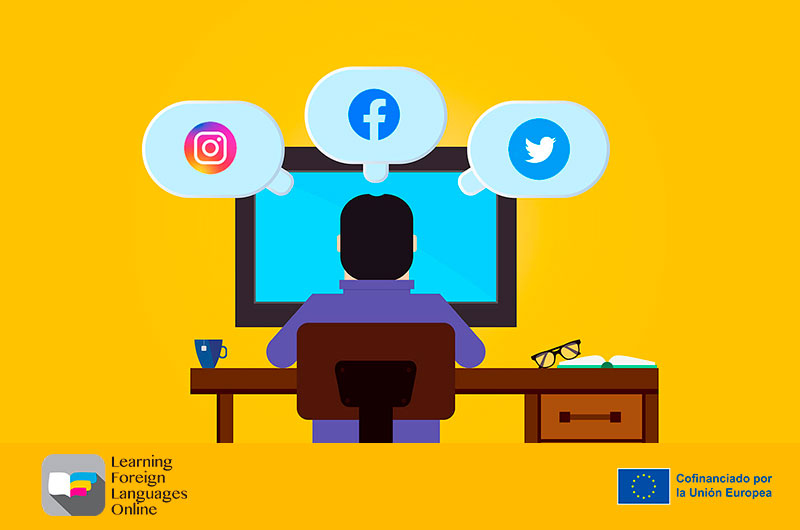Anxiety during language learning has been extensively researched and numerous elements have been identified as possible causes. It has been established that anxiety in a foreign language classroom, whether physical or virtual, is distinct from other types of anxiety and that it negatively affects both proficiency and the rate of language acquisition. Language anxiety” when learning a foreign language can stem from a variety of factors; some of these include the learner, the teacher, the instructional approach or the methodology.
Low self-esteem, false assumptions about language learning, unfavorable encounters with the foreign language or culture, or the overall language learning experience can be sources of anxiety (Russell, 2020).
Language anxiety is “a distinct complex of self-perceptions, beliefs, feelings, and behaviors related to language learning that arises from the uniqueness of the language learning process” (Horwitz, Horwitz, & Cope; 1986). Remember that learning a language in a naturalistic setting, such as by immersion while traveling or residing abroad, is not related to the type of anxiety associated with language learning in a traditional or online classroom.
A student who self-studies a foreign language online, on the other hand, may have an advantage in that they do not have to struggle with communication apprehension as is evident in physical classrooms. However, they suffer from test anxiety “the tendency to view with alarm the consequences of inadequate performance in an evaluative situation” (Sarason, 1984, p. 214).
Some students are not good candidates for online language learning, especially those who lack the drive and/or self-discipline necessary to take ownership of their own learning. In addition, online learners must allocate sufficient time to complete the course on time, ask for help when needed, and be willing to learn despite being emotionally and physically isolated from their peers (Russell & Murphy-Judy, 2020; White, 2010).
Some students with high levels of language anxiety may decide to enroll in an online course because they want the comfort of anonymity and the assurance that they will not have to participate as much in speaking exercises or contact with other students (Pichette, 2009). As a result, learners may experience anxiety related to both the language and the use of educational technologies used to communicate in the target language.
However, online language learners are generally required to interact with other learners and their instructor, if applicable, in the target language using audio and video tools. More precisely, to enhance their learning and reduce their language anxiety, learners must find a way to engage in synchronous conversations with a native speaker.
Strategies for Overcoming Foreign Language Anxiety
Fear of negative evaluation, test anxiety, and communication apprehension are the most common influencing factors among self-directed learners with respect to foreign language learning. Language learners who have low self-esteem, negative internal dialogue, or a general lack of confidence in their language skills may be more prone to anxiety (Almekhlafy, 2020).
The use of techniques including mindfulness exercises, cognitive behavioral therapy, and relaxation techniques have been shown to help language learners overcome their anxieties and progress more quickly. The following strategies can be employed to overcome language anxiety or fear when learning a foreign language:
- Focus on the real goal: communication: Speaking perfectly is not the goal of learning a foreign language. Apart from the ridiculous amount of pressure it puts on you, expecting you to speak without making mistakes isn’t very reasonable either. Therefore, it is vital to concentrate solely on communicating, but you need to know enough words to do this, so develop your vocabulary. To do this, use dictionaries with pronunciation and audio that you can imitate and make sure you are familiar with the most typical nouns and verbs in your target language. It will be beneficial to commit to acquiring a specific number of common nouns and verbs, for example, seven per week or one per day, and then it is advisable to speak with native speakers as often as possible to practice your new vocabulary. Shift your emphasis from speaking accurately to communicating and you will feel the tension melt away, and most likely make fewer mistakes!
- Set achievable goals: If your perfectionism makes you aim for the unattainable, you won’t make much progress in your language learning. Making sure your language learning goals are reasonable and achievable will help you avoid feeling worse when you can’t meet them. Language perfectionism and language anxiety feed each other. Here are some examples of typical unattainable language learning goals and their realistic equivalents: Unrealistic: Even though I’m just starting out, I’ll speak perfectly if I practice and study hard.
- Realistic: I cannot hope to avoid using mutilated terminology. To become fluent, I must go through many phases of fluency. What I can do is track how many mistakes I make while striving to make fewer.
- Transform unproductive ideas: You may be familiar with the term “cognitive distortion,” which refers to incorrect, irrational, negative thought processes that lead us to believe we are less than. For example, you might go to a party and say, “The people there won’t like me,” even though you have no idea how they will react to you. Also, how could complete strangers have an opinion about you? Now is the time to identify the cognitive distortions that impede your achievement in learning a language. We may catch ourselves in the act if we can identify what they are. Some of the most common cognitive distortions related to language learning are:
- Should: “By now, I should be fluent”.
- Personalization: “Because of my foreign accent, the cashier was very mean to me.”
- Filtered: “I just spoke with perfect grammar and excellent fluency, but the one word I mispronounced is all that matters.”
- Generalization: “I’d better give up since a native speaker couldn’t understand me when I tried to speak Italian years ago.”
- Control fallacies: my life is so busy with work and family that I will never get the chance to learn French, so I can’t help it if it’s bad.
- Almekhlafy, S. S. A. (2020). Online learning of English courses through blackboard in Saudi universities in the COVID-19 era: perception and usage. PSU research review, 5 (1), 16-32.
- Horwitz, E. K., Horwitz, M. B., & Cope, J. (1986). Anxiety in the foreign language classroom. The Modern language journal, 70(2), 125-132.
- Kawa, S. (2023). Strategies for reducing anxiety in language learning: measuring effective techniques for managing anxiety in the language learning process.
- Pichette, F. (2009). Second language anxiety and distance language learning. Annals of foreign languages, 42(1), 77-93.
- Russell, V. (2020). Language anxiety and the online learner. Annals of foreign languages, 53(2), 338-352.
- Russell, V. and Murphy-Judy, K. (2020). Online language teaching: a guide to designing, developing and delivering online, blended and flipped language courses. Routledge.
- Sarason, IG (1984). Stress, anxiety, and cognitive interference: reactions to testing. Journal of personality and social psychology, 46(4), 929.
- Blanco, C. (2003). Language learning in distance education. Cambridge University Press.
- Reaves, L. (2022). 4 reliable tips for overcoming foreign language anxiety.







